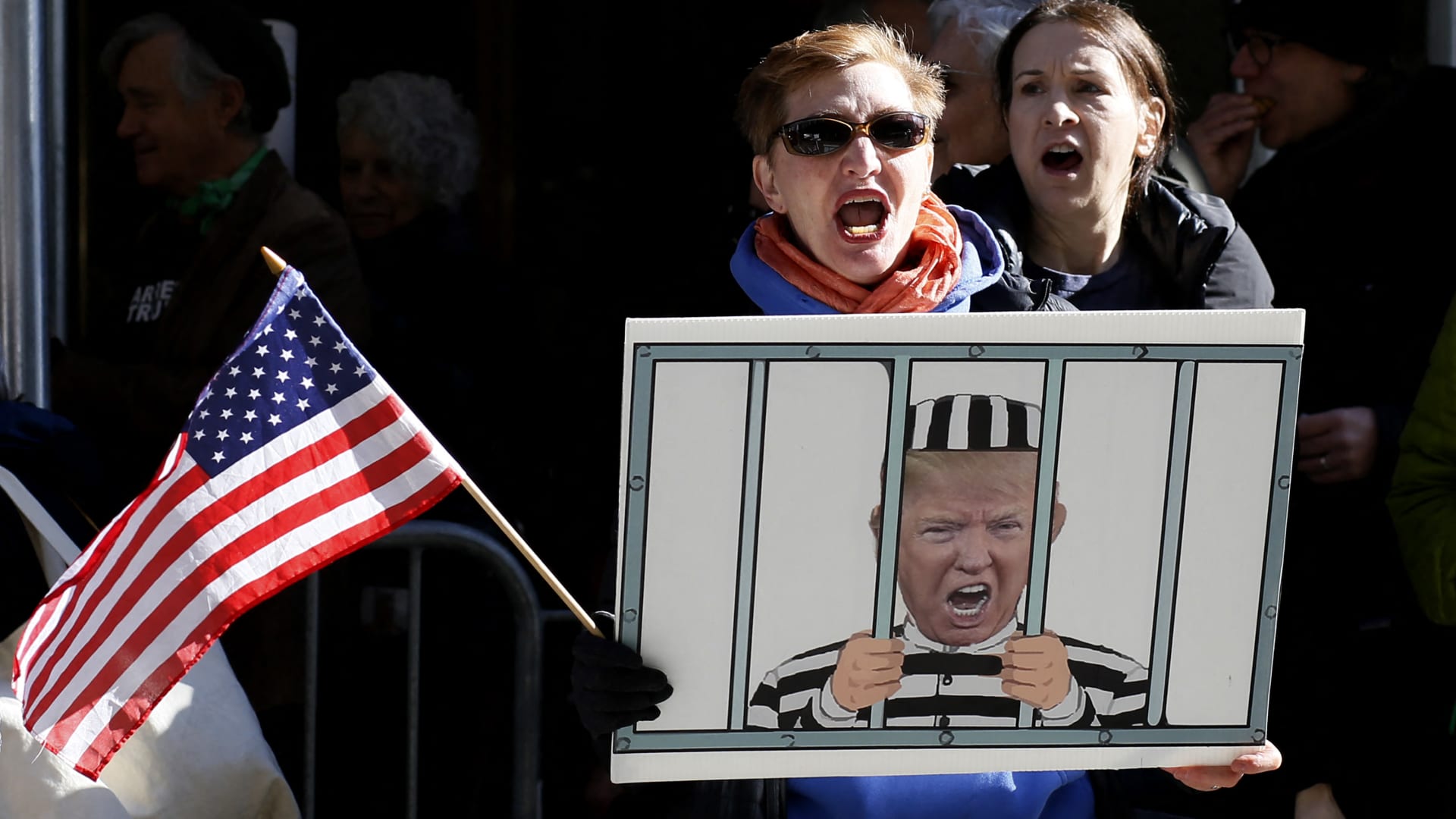Anti-Trump demonstrators protest outside the Manhattan District Attorney’s office in New York City on March 21, 2023.
Leonardo Munoz | AFP | Getty Images
Former President Donald Trump said he expected to be arrested by the Manhattan District Attorney’s Office, which is in the final stages of an investigation into a hush money payment made to a porn star shortly before the 2016 presidential election.
But even if the grand jury hearing evidence in the probe does vote for an indictment, it’s unclear when Trump would be arrested. Trump predicted that he’d be arrested on Tuesday, which came and went without incident. Multiple news outlets, citing law enforcement sources and people close to Trump’s legal team, reported Monday that they don’t expect an arrest or initial appearance to occur before next week.
Trump has denied wrongdoing and accused the DA, Alvin Bragg, of conducting a politically motivated prosecution against him, a leading Republican presidential candidate. He has called on his supporters to protest against the potential criminal charges.
If an indictment is returned, Trump will become the first former president in U.S. history to face criminal charges — and under those unprecedented circumstances, Trump’s possible arrest could play out in multiple ways.
Here’s how the process could go:
Surrender
The grand jury was impaneled in January to determine whether there was enough evidence in Bragg’s probe to charge Trump with a crime. Trump was invited to appear before the grand jury earlier this month, a move that is seen as one of the final steps before the end of the investigation. Trump declined to testify.
If the grand jury votes for an indictment, it will first be filed under seal, and it could stay that way until around the time Trump is presented before a judge. It could also be unsealed earlier by a judge overseeing the matter.
Trump’s lawyers would be notified of the indictment and a surrender date will be determined. That time is negotiable: It could be as soon as a day or two after the indictment, or it could be further out.
“Usually these things are pretty well coordinated with the defense lawyers,” said Michael Bachner, a white-collar criminal defense lawyer and former assistant district attorney in the Rackets Bureau of the Manhattan DA’s office.
Given Trump’s recent calls for protests, prosecutors may have an incentive to give Trump a shorter surrender date, Bachner said.
Trump, who has spent much of his post-presidency time at his Mar-a-Lago resort home in Palm Beach, Florida, will likely travel directly to the district attorney’s office in lower Manhattan to turn himself in.
While Trump could technically have an avenue to challenge extradition to New York, that move is considered extremely unlikely.
“It doesn’t behoove Trump to run and hide from state to state,” wrote Jeremy Saland, a former Manhattan assistant district attorney. Fleeing the charges “would blow up his image of virile masculinity worse than a horseless, shirted Vladimir Putin,” Saland added.
Trump’s attorney, Joseph Tacopina, said last week that Trump will follow the normal procedure if he is indicted.
Once at the DA’s office, Trump would be formally arrested, he’d be fingerprinted, get his mugshot taken and be interviewed by DA detectives for an arrest report. He will also be asked for so-called pedigree information, which is the defendant’s personal information, including his name, address and date of birth.
Arraignment
After getting booked, Trump will be transported to a courtroom for his arraignment.
Generally speaking, a defendant is in handcuffs at the time he’s brought to the courthouse and uncuffed at the time the court proceedings begin.
But some news outlets, citing sources familiar with the matter, have reported that Trump may be able to avoid an infamous “perp walk” — having to walk down a courthouse hallway in handcuffs in front of the press — to attend his arraignment.
Trump is protected by U.S. Secret Service agents who plan to stick with him throughout the process of his possible arrest in New York, NBC News reported Monday. Those agents will work to keep Trump out of public view while he’s being booked, a former agency official told NBC.
At the arraignment, Trump will be informed of the charges against him and asked to plead guilty or not guilty — not guilty being by far the likelier option — or have his lawyer enter the plea on his behalf.
The lawyers and judge may also have a discussion about the presentation of evidence in the case.
Since any potential criminal charges at play are nonviolent in nature, Trump would most likely be released on his own recognizance, meaning without having to pay bail.
“I don’t think bail’s really an issue here,” said Lance Fletcher, a criminal defense attorney and former Manhattan prosecutor.
If Trump is freed without any bail set or other unforeseen restrictions, he could return to his Florida residence that same day.
“He’s not a risk of flight,” Bachner said. “Everyone knows his face.”
Follow our live coverage of the New York grand jury’s indictment of former President Donald Trump.

